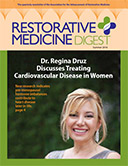Following a highly-publicized study in 2002, in which the Women’s Health Initiative reported increased rates of breast cancer, coronary heart disease, stroke, and venous thromboembolism in postmenopausal women on combination hormone replacement therapy (HRT), the use of HRT for the treatment of menopausal symptoms fell out of favor. Increasingly, women and their physicians opted out of traditional therapy, which left patients more susceptible to hot flashes and night sweats.
This begged the question: would women just have to live with these unpleasant symptoms? Or could a different treatment protocol prove both effective and safe?
Beginning in 2003, researchers at the University of British Columbia in Vancouver, including Jerilynn Prior, MD, sought to answer this question.
Although oral micronized progesterone (OMP) alone had been shown to effectively mitigate menopausal symptoms, its cardiovascular safety was unknown. Observational data suggested that endogenous progesterone conferred cardiovascular system (CVS) protection in younger women with normal ovulation and menstrual cycles. However, no randomized, placebo-controlled trial had been conducted to examine the effects of OMP on specific CVS markers. The researchers, therefore, designed such a study — with the goal of describing the physiological effects of oral progesterone on human endothelial function, lipids, metabolic markers, and inflammation and coagulation status in healthy postmenopausal women.
The study, titled “Progesterone Therapy, Endothelial Function and Cardiac Risk Factors: A 3-month Randomized, Placebo-Controlled Trial in Healthy Early Postmenopausal Women,” evaluated 133 women from Vancouver between 2003 and 2009. Participants were between the ages of 49 and 55 years, had last experienced a menstrual period from one to 11 years prior, had not used hormones for six months or more, did not smoke, and did not have diabetes, heart disease or hypertension, nor use medicines to control those conditions. Their baseline CVS risk was therefore low, and similar to that of premenopausal women.
Non-placebo participants were administered 300mg of OMP daily (luteal phase equivalent) for the duration of the study.
The results, recently published in PLOS ONE, are encouraging. With the exception of HDL-C levels — which showed a minor but significant decrease — all other markers showed neutral to positive change. There was a trend toward improved endogenous nitric-oxide dependent forearm blood flow, neutral effects on body weight, waist circumference, blood pressure, heart rate, lipids, plasma glucose, inflammation, coagulation and Framingham General Cardiovascular Risk Profile.
In a concurrent study, “Oral Micronized Progesterone for Vasomotor Symptoms: A Placebo-controlled Randomized Trial in Healthy Postmenopausal Women,” patients assigned to progesterone reported significantly improved sleep and experienced no safety issues. Together with the above, these results suggest short-term CVS safety in the treatment of hot flashes and night sweats in healthy postmenopausal women.
To learn more about Dr. Prior’s research regarding the importance of progesterone for women’s health, see her article published in the Journal of Restorative Medicine, Vol. 3, No. 1, available free online at http://restorativemedicine.org/journal/. Dr. Prior is a keynote speaker at the 14th Annual International Restorative Medicine Conference, September 15-18 in Hilton Head, S.C.
Reference:
Prior JC, Elliott TG, Norman E, Stajic V, Hitchcock CL. Progesterone Therapy, Endothelial Function and Cardiovascular Risk Factors: A 3-Month Randomized, Placebo-Controlled Trial in Healthy Early Postmenopausal Women. Hermenegildo C, ed. PLoS ONE. 2014;9(1):e84698. doi:10.1371/journal.pone.0084698.
